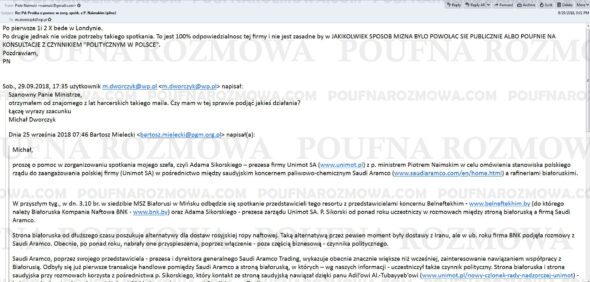The website „Poufna Rozmowa” (Confidential Conversation – ed.), known for publishing leaked emails, revealed correspondence between the head of the Prime Minister’s Chancellery and the Government Plenipotentiary for Strategic Energy Infrastructure Piotr Naimski, in which Michał Dworczyk asked whether he should organize a meeting with Unimot, a private oil company from Poland, where the parties would talk about supplying Saudi oil to Belarus. Unimot is one of the partners of the Orlen-Lotos merger – writes Wojciech Jakóbik, editor-in-chief at BiznesAlert.pl.
The email was sent in 2018. „Do you want me to take any action on this?,” the minister asked. Piotr Naimski gave a short answer saying that he would be in London during the proposed time, and didn’t think that such a meeting was necessary. „The company is completely responsible for this, and there is no reason to publically or confidentially rely on consultations with the political factor in Poland,” Naimski replied.
A reverse flow on the Druzhba Pipeline
It is worth recalling that in the past Unimot almost arranged the start of deliveries of American oil through the Gdańsk refinery to Belarus. This was at a time when Poles were considering whether it was worth launching a reverse flow of the Druzhba pipeline after the contaminated oil crisis of 2019, but before the regime in Minsk launched a bloody crackdown on the Belarusian opposition in the summer of 2020, which crushed the possibility of such cooperation. The Polish Unimot and the American Getka argued that the White Eagle blend could reach Belarus, but the involvement of the government in Poland was needed. BiznesAlert.pl talked about it with the president of Getka, Dariusz Cichocki. It is worth recalling that the oil offered to Belarusians was American. This was happening at a time when the US State Department was talking with Minsk about independence from Russia, Polish-American-Belarusian cooperation seemed then potentially possible, so the Saudi plot from the email leak is something new.
From the beginning the operator of the oil transmission network – PERN, which is under the supervision of minister Naimski, has been cautious about cooperating with Belarusians. Still, the company decided to modernize the infrastructure of the Druzhba oil pipeline. Belarus talked a lot in the past about diversifying oil supply, but then only used those stories to improve its negotiation position and stuck to importing from Russia. This happened after the bloody summer of 2020, after which the discussions on diversification ended, and Belarus signed a new contract with Rosneft. If the Belarusians continued their course towards independence from the Russians, the first deliveries of non-Russian oil could have gone through the reverse of the Druzhba pipeline at the beginning of 2021.
Leak on key day for the Orlen-Lotos merger
The emails on Unimot being involved in the Belarusian operation leaked on the day of the announcement of the terms of the merger of the PKN Orlen-Lotos Group. These include the participation of four partners: MOL from Hungary, which is to take over the gas stations, Rossi Biofuel Zrt from Hungary, which is to take over Lotos’s biorefuel business, as well as Saudi Aramco, which is to acquire 30 percent of the joint venture managing the Gdańsk refinery, and Unimot, which is to take over the asphalt business and the oil terminal in Szczecin. The timing of the leak therefore does not appear to be coincidental, especially as Unimot was planning a conference on its plans for the merger on 13 January.
We’ll wait and see
Now that Polish-Belarusian relations are at their worst in history, due to the border crisis exacerbated by the regimes in Minsk and Moscow, there may be attempts at accusing the Polish government of collaboration. However, it is worth emphasizing once again that the Belarusian operation did not have the green light of Warsaw and was in its infancy, and started even before the bloody summer of 2020, which spoiled the chance for such cooperation. The Poles, led by minister Naimski, apparently rightly maintained a conservative attitude. It is not good that the minister wrote about such important matters from a private e-mail account. However, political changes in Belarus could pave the way for the launch of a reverse flow on the Druzhba pipeline and the growth of oil supply outside Russia to Belarus, on which PKN Orlen and Saudi Aramco, as well as other companies, could make money, competing for a new, promising market. This would, however, require Belarus to take a pro-Western turn, but the country is moving in a completely different direction, growing its dependence on Russia and integrating its oil market with Moscow’s.









